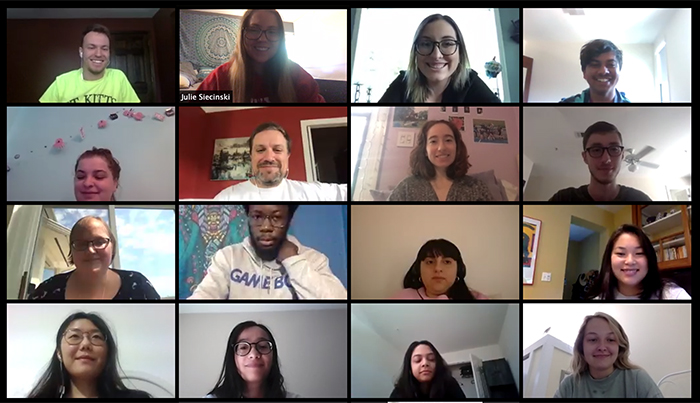Dickinson College Students Build Skills, Give Back Through Social-distance Internships

Community Action Intern Julie Siecinski ’21 helped rebrand a community resource, researched nonprofit bylaws, edited educational videos and researched a grant. “It’s an incredibly rewarding experience,” she says.
Students Gain Critical Skills for the COVID-19 Era While Helping Local Nonprofits
by MaryAlice Bitts-Jackson
Ellie Doblin ’21 (political science) sought meaningful alternatives to canceled summer internships. Jessie Anker ’21 (computer science) wanted to continue helping members of the Carlisle community. Audree Khalishah ’21 (environmental studies), an international student, hoped to deepen connections in her home away from home.
While their original summer plans were upended by the pandemic, these students found meaningful work through Dickinson’s new Civic Action Internship (CAI) program. The social-distance-friendly CAIs empower students to build new professional skills and contacts from the safety of home, while also making a difference in the local community when help is needed most.
Dickinson’s Center for Civic Learning and Action (CCLA) developed the internship program this spring in response to pandemic-intensified student and community needs. Out of a pool of 70 applicants, 16 students were selected to participate in the elite summer program, running from late May to late July.
“I've learned so much in these past few weeks that it's hard to imagine I was so close to imagining a summer without any internship or any plans because of COVID-19,” says Simran Dali ’22 (international studies), a CCLA student-coordinator who’s created online brochures and other website content, worked with Airtable databases and researched civic-education programs through the CAI so far.
“It’s an incredibly rewarding experience,” says Julie Siecinski ’21 (international business & management), who has helped rebrand a nonprofit center, researched nonprofit bylaws, edited videos and researched a community-reentry program grant through the CAI.

CAI interns meet virtually with CCLA Director Gary Kirk (second row, second from left).
Under supervision of CCLA staff, each intern works on several team projects proposed by 13 community partners and Carlisle’s Community Action Network. Some are summerlong; others can last a few hours, days or weeks. Daily Zoom team meetings with CCLA staff and collaborative Microsoft Teams documents keep everyone connected and on track. Weekly workshops help students sharpen professional and leadership skills and learn about the organizations they’re working with and the social-justice issues that inform their work.
While the students acquire contacts and experiences that are applicable in a variety of professional contexts, they also gather skills tailor-made for the current age. While helping the United Way organize a pandemic-reimagined school supplies drive, students gained insight on how to succeed at work during rapid and sweeping changes. Interning with several nonprofits at once provides a crash-course in different group dynamics. And, as Dali notes, collaborating remotely requires them to discover how to work creatively and effectively from wherever they are—a timely skill in the new-normal work world.
“I think going forward, remote collaborative efforts and skills are probably going to be the new normal, and very useful,” she says.
Meanwhile, even as they work remotely, the interns appreciate the sense connection and purpose that these internships bring.
“As an international student who's been on campus throughout the pandemic outbreak, I’m so thankful to my friends, faculty and staff at Dickinson who have been so supportive of me, and I wanted to extend my gratitude to the bigger Carlisle community,” says Khalishah, a native of Indonesia who was unable to return home at the start of the global pandemic. “I know how important community is, especially at a time like this. So it’s extremely rewarding to be able to make a real impact in my adopted home.”
“This is an opportunity to engage with Carlisle in a new way and reinforce my connection to the community which I love and miss so much,” says Doblin, who’s researched post-prison community-reentry programs, applied for grants, helped redesign a logo and a community space and researched neighborhood profiles. “I am extremely proud of the work we are doing together.”
TAKE THE NEXT STEPS
Published July 9, 2020